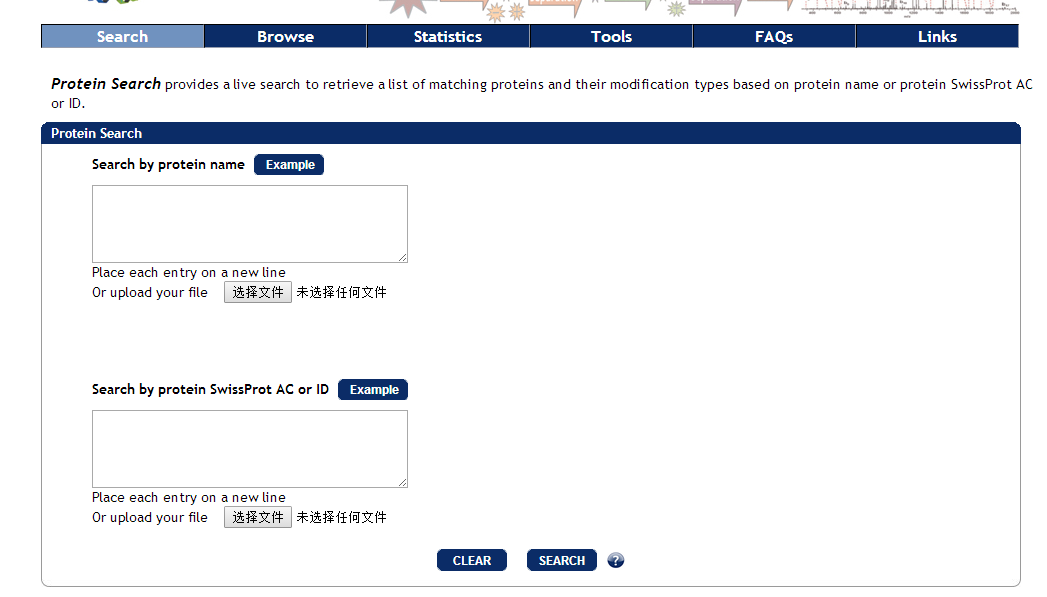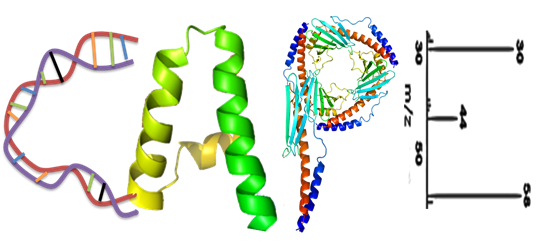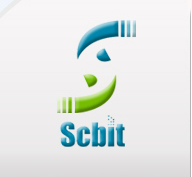![]() What's it?
What's it?
PTMs of proteins play essential roles in almost all cellular processes, and are closely related to physiological activity and disease development of living organisms. The collection of these data will provide invaluable source to understand the cellular processes and the signaling pathways regulated by PTMs. While many databases have been established to collect information of protein PTM sites, there is no such resource providing a searchable platform for quick and in-depth analysis of user PTM datasets by comparing to the known PTMs. SysPTM was thus designed to incorporates the existing features of numerous previous databases and modification datasets from MS/MS experiments reported in the literature, presented in a user-friendly browser with a suit of analysis tools to support high-throughput annotation of proteomics PTMs. The database is publicly available at http://lifecenter.sgst.cn/SysPTM/.
![]() How to use it?
How to use it?
SysPTM is a user-friendly web tool and service to help you explore PTM-related information in peptides and proteins. You can access the database as follows: Search The "Search" page may be the most frequently used service. "Text search" is a powerful engine to search keyword through the database, such as protein name (eg, cellular tumor antigen TP53), protein identifier (eg, P53_HUMAN), or protein accession number (eg, P04637). ”Sequence search” is a Blast based engine to find similar proteins by sequence, which is complementary to “Text search”. In principle, you can input any FASTA protein sequence in the input box. Click “example” button to get an example demo. -----Details about the Search help Browse The Browse page allows users to scan PTM proteins based on given PTM type, Data source or Kegg Pathway. For the Kegg Pathway, a pathway map marked with PTM proteins will also be displayed by clicking the pathway ID. The yellow items on the map contain PTM information, click and find it. The green ones belong to the selected species. -----Details about the Browse help Statistics This page gives the data increase in SysPTM with each updated version. The PTM protein numbers, PTM site numbers, and peptide numbers (if available) of each data source in the most current version are given. Download To protect the license of other databases, we do not provide download of SysPTM-A data; users can download them via the original websites. SysPTM-B data can be downloaded for research use only but should not be distributed to a third party without prior consent. FAQ The FAQ page is a help document for SysPTM database. You can find solutions to almost all your questions here, so try to read it carefully. Further questions or advices can be sent to: sysptm2.0@gmail.com . Links The Links list many web tools based on different algorithms to predict potential PTM sites, types, and motifs, et.al. PTMBlast SysPTM has large PTM site collection from public databases and MS experiments(see statistics for detail). You can evaluate your data and affirm novel PTM sites by comparing your own data with SysPTM repository. PTMBlast provides three candidate comparison methods: 1. Query protein sequence must be entirely identical with entries in SysPTM, then compare the overlapped PTM sites. 2. Query protein sequence has given similarity with entries of SysPTM by Blast, then compare the overlapped PTM sites. 3. Directly map query peptide to protein sequence, and compare the overlapped PTM sites. -----Details about the PTMBlast help PTMPathway PTMpathway can be browsed to find PTM information in a given KEGG pathway, or find PTM information for a particular protein or a protein list in all related KEGG pathways. -----Details about the PTMPathway help PTMPhylog PTMPhylog tool can help you explore the relation between different species in terms of protein conserved regions as well as PTM information, as the example indicates. -----Details about the PTMPhylog help PTMCluster PTMCluster is used to detect PTM sites that tend to form “clusters” on a protein sequence, which locate in a physically close space. -----Details about the PTMCluster help PTMGO PTMGO is used to support functional annotation and enrichment analysis of PTM proteins, which could facilitate a better understanding of PTM events in complex biological processes. -----Details about the PTMGO help
![]() Institute
Institute
Shanghai Center for Bioinformation Technology (上海生物信息技术研究中心)
![]() Author
Author
Menghuan Zhang(张梦欢),Lu Xie(谢鹭)
![]() Support
Support
![]() Publication
Publication
![]() Figure
Figure

![]() Funding source
Funding source
[{"id":"1","name":"CNHPP int'l project 2:2014DFB30030(蛋白质组生物大数据及其标准系统)"},{"id":"3","name":"CNHPP int'l project 3:2014DFB30020(中国人类蛋白质组学数据的知识发现)"}]





